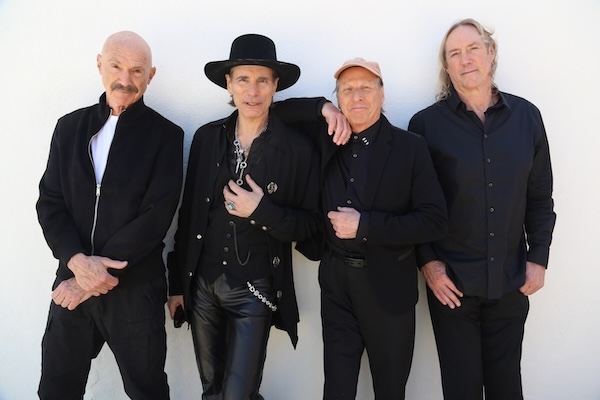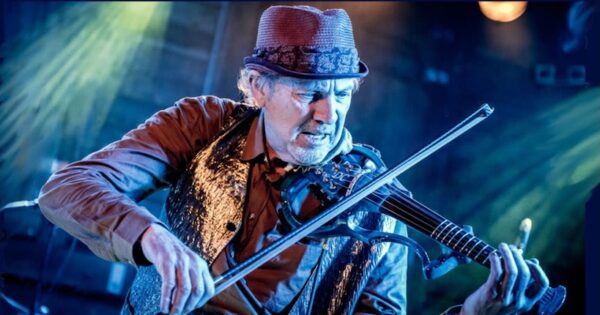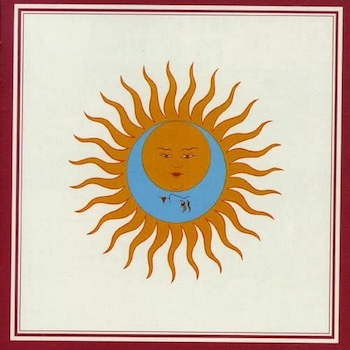Concert Review: David Cross Band/Beat — A King Crimson Moment
By Jason M. Rubin
Just weeks apart, two different groups have made their way to Boston on international tours — without Robert Fripp but with his blessing — showcasing specific eras of King Crimson’s existence.
Of all bands that launched in the late ’60s to be having a moment right now, King Crimson, the inscrutably eclectic progressive rock godfather, seems an unlikely candidate. The volatile band went through innumerable lineups and approaches to music-making, to the point that fans tend to identify their allegiance to the group by specific eras and lineups. (For example, I’m a ’73-’74 guy, with ’81-’84 a close second.) The only constant through their up-and-down, on-and-off history was guitarist Robert Fripp, who thoroughly remade his headmaster image during the pandemic by releasing bizarre music videos with his wife, singer Toyah Willcox. Fripp ended the group (not for the first time) in 2021 following a few years of touring with alumni players. It was essentially a repertoire group, its focus on playing obscure songs from the band’s early catalogue with no concern for creating and releasing new material.
Fripp may be done with King Crimson, but other people (fans certainly, but former members as well) are not. Just weeks apart, two different groups have made their way to Boston on international tours – without Fripp but with his blessing – showcasing specific eras of the group’s existence. Happily for me, the two bands cover the two periods I like best.

The members of Beat. Photo: Alison Dyer
Back in October, Beat came to the Shubert Theatre in Boston. This band features two original members of the ’81-’84 Crimson (guitarist/singer Adrian Belew and Boston’s own Tony Levin, a player of bass guitar and Chapman Stick), along with Frank Zappa protegé Steve Vai on guitar (replacing Fripp), and Tool drummer Danny Carey on the throne originally occupied by Bill Bruford. The band covered the three albums of this particular era of Crimson: 1981’s Discipline, 1982’s Beat, and 1984’s Three of a Perfect Pair. The original lineup was the first to feature two guitarists, and a trademark element of that band’s music was a complex interweaving of guitar lines, with a percussive foundation comprising Levin’s Stick tapping (and his patented Funk Fingers, small drumsticks attached to his fingers that he uses to beat his bass strings), and Bruford’s hybrid electric/acoustic kit.
Beat covered pretty much all the essential tracks from the three albums they represented, as well as one song from 1974, the title track to Red. The band deftly performed a balancing act between covering this difficult music (or at least elements of it) faithfully, while also allowing the enormously talented musicians, especially the new guys, to put their own individual stamp on the proceedings. Carey, for example, is not from the Bruford school (which is pretty much a school of one), but in assembling his kit he made sure to incorporate sounds and components that enable him to evoke the early-’80s timbres while bringing his own considerable skills and energy to the performances.
Beat returns to the area on December 6, when they play Lynn Auditorium.

Violinist David Cross in action. Photo: courtesy of the artist
Then on November 3, the Taffeta Music Hall in Lowell played host to “The David Cross Band Plays King Crimson.” Cross played violin on the three studio albums from the early-mid ’70s era: Larks’ Tongues in Aspic (1973), Starless and Bible Black (1974), and Red. His band includes John Mitchell (vocals and guitar), Sheila Maloney (keyboards), Mick Paul (bass and vocals), and Jack Summerfield (drums), all of whom have prog credentials in Europe.
Last year, Cross toured the continent celebrating the 50th anniversary of Larks’ Tongues in Aspic, playing the album in its entirety. The current tour also features the full album, plus three other songs from that era and two original songs recorded by his band. If it’s not quite the fully immersive Crimson tribute show that Beat supplies, it must be noted that this era’s music is enormously difficult and challenging to play, in part because this lineup emphasized improvisation to an extent not seen in earlier or later lineups. On the original albums, Fripp (of course) was the guitarist and the band also featured Bruford, who left Yes after recording Close to the Edge to join Crimson, a band that would never approach his former group’s commercial success. The late John Wetton (Family, UK, Asia) was the bassist and vocalist, and percussionist Jamie Muir added his distinctive din to Larks’ Tongues in Aspic before leaving to join a Buddhist monastery. The Discipline era was an incredible collection of talent, but the ’70s Crimson was a real beast.
In concert, Cross and his band proved they were up to the challenge. Opening with an original song, “Tonk,” a serviceable piece of prog clearly influenced by Cross’s time in Crimson, the band members showed they meant business. They then launched into “The Great Deceiver” from Starless and Bible Black. With a spiky theme played in unison at breakneck tempo and plenty of dynamic shifts, this is a notoriously difficult song to play, yet the musicians went at it with cheerful abandon. This was followed by “Red,” which Beat also played. This is a tune where progressive rock and heavy metal join in a menacing alliance (a very effective cover was recorded by the since-disbanded Boston-based jazz group, the also-quite-eclectic Either/Orchestra, in 1990). Another original, the aptly named “Calamity,” was noisy and engaging.

Cover art of King Crimson’s Larks’ Tongues In Aspic.
Then the piece de resistance: all six songs from Larks’ Tongues in Aspic, in order. If you’ve never heard this album before, yet are inclined toward highly improvisational progressive rock that owes as much to Hendrix as to Stravinsky, I can only tell you that the impact of a virgin listening is one that stays with you. The David Cross Band brought that first-time feeling back for me, which is an accomplishment. Together, Mitchell and Paul came close to replicating Wetton’s distinctive tenor, while Cross took the liberty of playing considerably more solos than he was afforded on the original album. Playing a sonorous electric violin, he was also able to cover parts that Fripp originated. On drums, Summerfield was a revelation, playing Bruford’s most intricate creations with a smile on his face.
As an encore, the band played “Starless,” an epic tune that closed the Red album. Unlike the Larks’ Tongues material, which was expanded to allow for more ferocious jamming, this song was actually condensed. One of the great things about “Starless” is that it progresses very slowly and deliberately for minutes, gradually picking up steam and finally bellowing forth like a dragon with heartburn. This live version snipped some of that build-up and so the impact of the resolution wasn’t quite what it is on record. Still, it was the last song on the last album by this era of King Crimson, and so it was welcome and appropriate. This was the final night of a North American tour; later this month, the band continues its journey throughout South America.
Wrapping up, I might add that from 2002 to 2005, predating both of the efforts described in this review, a group calling itself the 21st Century Schizoid Band featured a number of former Crimson members from the 1969-1972 lineups. Also, a Somerville-based prog band of estimable talent called We Broke the Weather opened for the Cross Band and impressed. Finally, over the past 18 years, seven former Crimson members have died and many who survive are in their 70s and 80s, so the chances of more such tribute tours are slim.
Jason M. Rubin has been a professional writer for 40 years. He has written for Arts Fuse since 2012. His books include Villainy Ever After (2022), a collection of classic fairy tales told from the villains’ point of view; and Ancient Tales Newly Told (2019), a pairing of two historical romances: The Grave & The Gay, based on a 17th-century English folk ballad; and King of Kings, about King Solomon and the Queen of Sheba, told primarily from the Ethiopian tradition. In addition, Jason teaches journaling workshops and is a member of the New England Indie Authors Collective. He holds a BA in Journalism from the University of Massachusetts Amherst. He can be reached at http://www.jasonmrubin.com.

Amazing review, Jason! It makes me both wish that I had been there and feel like I was.
Superb review Jason. I was hoping to see David’s band while they toured in the US but it did not work out for me. I am hoping they return. I recall from one of The David Cross Band’s facebook posts that they plan to be touring the US again in 2025. I really hope they return then so I can see them.
I will be seeing The Beat Band in San Antonio next month. I saw the Larks Tongues’ Band three times in 1973-74 in San Antonio. I still count those shows as my all time favorite concerts from a lifetime of going to shows and that band as one of the greatest improv outfits of all time. Over the years I caught the Discipline and double trio bands multiple times as well (1981,95 in Austin). I am interested to see how Steve Vai and Danny Carey uphold the tradition of that very excellent band. King Crimson has had a very up and down history but the bands represented by these two tribute outfits were the mountain top of the bands that shared that name ( including the original band and the band that recorded Lizard with the aid of Keith Tippett and his excellent jazz associates). The most recent outfits that toured from 2013 to 2021 with Mel Collins and three of the best drummers any band could wish to have was outstanding as well, but I digress. Thanks again for this wonderful review. Best wishes and kind regards.
I saw the concert on December 3, at the Bushnell Theatre in Hartford, CT. It was one of the best concerts I’ve ever seen.